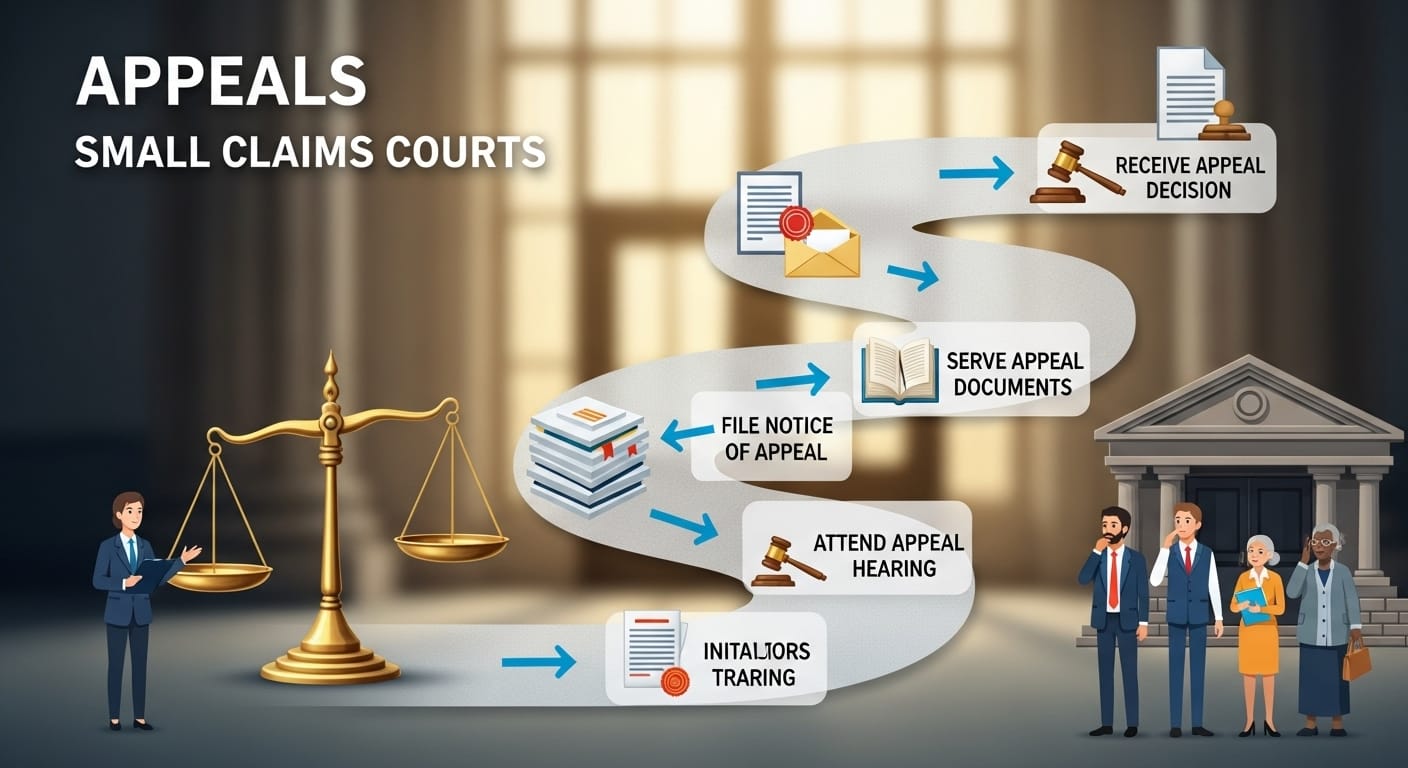So, you’ve found yourself in small claims court, and you’ve done everything right—got your evidence together, showed up on time, and presented your case in the best way possible. And then the unthinkable happens: you lose. Maybe the judge just didn’t see things your way, or perhaps there was a minor detail that sunk your case.
It’s frustrating, right? But don’t throw in the towel just yet. There is an appeals process, and while it might not be as glamorous as a courtroom drama on TV, it can give you another shot at getting things right.
So, what’s next? Let’s explore the appeals process in small claims court. I promise it’s not as complicated as it sounds, but it does require some attention to detail, a little patience, and maybe a hint of luck. After all, who doesn’t love a second chance?

Top Takeaways and Key Concepts
Understand What an Appeal Is: Appeals ask a higher court to review a lower court’s decision based on legal errors.
Check Eligibility and Deadlines: Verify your state’s rules and file your notice of appeal within the required timeframe.
File Proper Paperwork: Submit a notice of appeal and pay necessary fees to initiate the process correctly.
Know Legal Grounds: Appeals must show the judge made a mistake applying the law or overlooked key evidence.
Prepare for a Review, Not a New Trial: Appeals focus on the trial record; no new evidence or witnesses are allowed.
Summary of This Article
Please Note: This post may contain affiliate links. If you click one of them, we may receive a commission at no extra cost to you. As an Amazon Associate, I earn from qualifying purchases.
The article explains how to appeal a small claims court decision after losing a case. It clarifies that appeals are formal reviews by a higher court, focusing on legal errors or overlooked evidence rather than re-arguing the case. Success depends on understanding state-specific rules, meeting deadlines, filing the proper paperwork, and demonstrating valid legal grounds. The appeal hearing reviews the original trial record, and outcomes may include reversing the judgment or remanding the case. Working with a lawyer can improve your chances, while weighing costs and benefits is essential before proceeding.
What Is an Appeal?

Before we go any further, let’s answer a crucial question: what exactly is an appeal? In simple terms, an appeal is when you ask a higher court to review a decision made by a lower court. In the world of small claims, this typically means asking a higher-level court to take another look at the judgment in your case.
Now, it’s not just about whining that the judge was wrong (though we’ve all been tempted). An appeal is based on specific legal grounds, such as mistakes in the way the law was applied or new evidence that could change the outcome. Essentially, you’re saying, “Hey, judge, I think you missed something important here, and I deserve another shot.”
Can You Appeal a Small Claims Case?

Here’s the big question: Can you actually appeal a small claims case? The answer is: it depends. In many states, small claims court decisions can be appealed, but there are usually restrictions. For example, you may only be able to appeal if the case was heard by a judge (not a commissioner), and you typically must appeal within a certain timeframe.
So, before you start getting excited and imagining victory on the horizon, take a step back and check the rules in your state. These rules will help you figure out if you even have grounds for an appeal. Don’t forget to mark the deadline on your calendar—appeals aren’t known for their flexibility.
The Appeal Process: A Roadmap
Okay, you’ve decided to appeal. Now what? The appeal process in small claims court isn’t a simple “show up and talk” affair. There’s paperwork to fill out, deadlines to meet, and some serious thinking to do about your strategy. Let’s break it down.
First, you’ll need to file a notice of appeal. This document tells the court you’re not happy with the outcome and that you want to try again. But wait—before you file, check your state’s rules to ensure you’re within the timeframe. In some places, you might only have 10 to 30 days after the judgment to file your notice of appeal.
Next, you’ll need to pay a fee, which can range from modest to “I hope my case is worth it.” This fee is necessary to keep the wheels of justice turning. After that, your case will be scheduled for a hearing before a higher court.
This time, there’s no need to worry about impressing a judge with a well-prepared speech or wearing a suit. The appeal is often a more formal review of the existing case—no new witnesses, no new testimony. Just a look at what was already said.
Grounds for Appeal: What Are You Arguing?
You can’t just appeal because you’re feeling salty about the result. To win on appeal, you’ll need solid legal grounds. This usually means proving that the judge made an error. And I’m not talking about a simple misstep, like accidentally calling your name wrong or knocking over a coffee cup. Errors like that don’t count.
You’ll need to show that the judge made a mistake in applying the law or overlooked important evidence. For example, maybe the judge ruled based on a law that doesn’t apply to your case, or they ignored key evidence that could have changed the outcome. Your best bet is to work with an attorney who can help you figure out whether you have strong legal grounds for an appeal.
What Happens During the Appeal Hearing?
At this point, you may be thinking, “Great, I’ve filed my appeal. Now I get to stand in front of a higher court and present my case again, right?” Not exactly. Unlike your first court appearance, the appeal hearing is much more limited in scope. Think of it as a review session where the judge is going over the case with a fine-tooth comb.
You won’t be able to introduce new evidence or call new witnesses. Instead, the appellate judge will look at the trial record, which includes the evidence and testimony that was presented during your original case. This judge is looking for mistakes, not fresh arguments.
They may ask questions about how the original trial was conducted, and they may even ask you to explain why you think an error occurred. But don’t expect the same kind of back-and-forth that you had in your first court session.
What Happens After the Appeal?
So, you’ve gone through the appeal process, and the judge has made a decision. What now? It depends. If the appeal is successful, the higher court may reverse the original judgment, which means you win! Or, they might send the case back to the original court for a new trial, where things might play out differently.
But if the appeal fails, the original judgment stands, and there’s usually no going back. That’s it. Your case is over, and you’ll have to deal with the consequences—whether that’s paying up, giving up, or whatever it is you were hoping to avoid in the first place.
Tips for Navigating the Appeals Process
- Know the Rules: Each state has different rules for appealing a small claims case. Get familiar with them so you don’t miss deadlines.
- Build Your Case: The best way to win an appeal is to show that the original trial was flawed. Have strong legal arguments and evidence to back you up.
- Consider the Costs: Filing an appeal can be expensive, especially with court fees and possible attorney costs. Weigh the costs against the potential benefits.
- Work with a Lawyer: While small claims court is designed to be DIY-friendly, an appeal is a different ball game. If you can, consult with an attorney.
Resources
How to Appeal a Small Claims Court Judgment
https://www.nolo.com/legal-encyclopedia/how-to-appeal-a-small-claims-court-judgment
Understanding the Appeals Process
https://www.legalzoom.com/articles/understanding-the-appeals-process
Small Claims Court: Appeal Basics
https://www.lawhelp.org/us/resource/small-claims-court-appeal-basics
Frequently Asked Questions
What does it mean to appeal a small claims court decision?
An appeal asks a higher court to review a lower court’s judgment for legal or procedural errors. It’s not a new trial but a review of the existing case record.
Can every small claims court decision be appealed?
Not always. Eligibility for appeal depends on state laws, and appeals are usually limited to cases heard by a judge rather than a commissioner or mediator.
How soon must I file a notice of appeal?
Most states require filing a notice of appeal within 10 to 30 days of the judgment. Missing this deadline typically means forfeiting your right to appeal.
What documents are needed to start an appeal?
You’ll need to file a notice of appeal with the court and pay applicable fees. Supporting documents like the trial record or transcript may also be required.
Can I present new evidence during my appeal?
No. Appeals are based on the original trial record only. The higher court reviews whether the law was applied correctly or key evidence was overlooked.
What outcomes are possible after an appeal?
The higher court may uphold the original ruling, reverse it, or send the case back to the lower court for a new trial depending on the findings.
Should I hire a lawyer for the appeals process?
While not always required, hiring a lawyer can significantly improve your chances since appeals often involve complex legal arguments and strict procedures.

Kevin Collier is a legal expert passionate about simplifying complex legal concepts for everyday individuals. With a focus on providing clear, practical information, he covers a wide range of topics, including rights, responsibilities, and legal procedures. Kevin aims to empower readers with the knowledge they need to navigate the legal landscape confidently, ensuring they can make informed decisions regarding their legal matters. Through insightful articles and easy-to-understand resources, he helps demystify the law, making it accessible to all.










